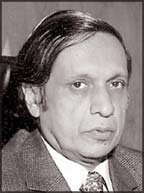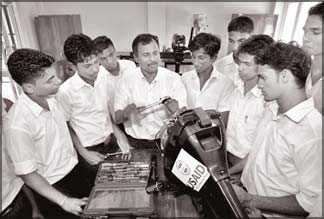|
Importance of quality assurance in universities -
Part II:
Tertiary institutions should be centres of knowledge and
professional training
 The text of a speech delivered by Higher
Education Minister Prof. Wiswa Warnapala at the launching of the
‘Quality Assurance Toolkit’prepared jointly by the UNESCO and the
Commonwealth Learning at the Sri Lanka Foundation on June 22, 2009. The text of a speech delivered by Higher
Education Minister Prof. Wiswa Warnapala at the launching of the
‘Quality Assurance Toolkit’prepared jointly by the UNESCO and the
Commonwealth Learning at the Sri Lanka Foundation on June 22, 2009.
Part I was
published yesterday (Link).
Heavy weightage in favour of Social Sciences, Humanities, Commerce
and Management must undergo a change, and one way of overcoming this is
to develop more and more professional programs. Any attempt to promote
this concept, as we experienced in the case of the Allied Health
Sciences, is certain to meet with stiff resistance from organizations
like the GMOA which does not seem to accept the need for diversification
in the higher education sector.
The traditional academic criteria should not determine the nature and
content of the new courses; in my view, the duration of a professional
program of study, something similar to what we tried to promote through
the Allied Health Sciences Programme, needs to be tied to the
requirements of the work place.
Different skills
A variety of short programs running to 1-2 years and 3 to 4 years,
can rightly respond to rapidly changing needs for different types of
skills. The country, at this stage of her development based on
stability, unity and harmony, needs more and more skills-oriented
programs of study, and the Universities, as they are still embedded in
the traditions which they inherited from British times, do not indulge
in innovative thinking relating to specialization and more flexibility
in the courses of study.
|

Job-oriented education will help solve unemployment problem |
The failure to modernize the curricula results in intellectual
retardation, a feature which is endemic in the system. The lack of a
robust intellectual culture, which must include both creativity and
standard research, has led to the deterioration of learning among the
undergraduates who, on certain occasions, indulge in violence without an
objective. Kelaniya University incident last week was one such example,
and it, more than anything, showed the lack of a commitment on the part
of the undergraduate community to establish a vibrant intellectual
culture in their own Universities.
Student activists, who provide leadership to student struggles of the
undergraduates, are drop-outs-who continuously failed the examinations
in order to remain within the University, and they are there to promote
political interests of a group of students working according to a narrow
political agenda. It is this trend which needs to be immediately
arrested in order to restore the learning environment of the
Universities.
In such an environment, the academic community, as the intellectual
peers in the place, has a major responsibility to be discharged as Sir
Eric Ashby, in his Masters and Scholars highlighted. Sir Eric Ashby,
writing immediately after the 1968 student unrest at the London School
of Economics (LSE), stated that “administration, faculty and students:
these are the components of the modern University. In theory all three
components work towards the same end. We talk of the University as a
community dedicated to the preservation, advancement and transmission of
knowledge”.
The country needs disciplined men and women as intellectuals - or as
members of the educated work force - but the product whom we produce
through a totally State-funded University system, is not a person with
all qualities of good citizenship. It needs to be emphasized that
education and lifelong learning are about improving knowledge and
skills; they are at the heart of personal and social development. One
aspect of personality development is the building of relations between
peoples, groups and communities, and therefore, education, at whatever
level it is given, fosters a deeper and more harmonious form of human
development.
What I am trying to stress is the pivotal role of secondary education
in the learning process of young people and in social development.
Tertiary institutions should be centres of knowledge and professional
training. In the Sri Lankan context, what requires is a fresh approach
to the learning process, based on a flexible system of education in
which educational opportunities could be enhanced. This cannot be
achieved without a comprehensive change in the learning environment of
the secondary schools, whose products come via a tution industry which
has created a tution culture in the country.
Tution industry in Sri Lanka is a big business and its annual
turnover runs to millions, and the type of learning culture, which it
fosters among the children of secondary schools, is not at all in the
interest of the intellectual development of the University
undergraduates. The criticism is that the system does not create
opportunities for the development of the personality with a broad
vision.
Basic knowledge
A good basic education should be combined with out of school
approaches that help people to experience the three dimensions of
education - ethical and cultural, scientific and technological and
economic and social - to learn about themselves, develop interpersonal
skills and acquire basic knowledge. In order to highlight the importance
of the school - here in this context I refer to the public school - in
the development of the personality and intellectual attainments, I would
like to quote Sir Ralph Furse, who was the Recruiting Officer for the
British Civil Service in Africa in Colonies of the period. “As to the
public schools, wrote Sir Ralph Furse, “ they are vital: We could not
have run the show without them. In England, Universities train the mind;
the public schools train character and teach leadership’. I do not think
for a moment that we should emulate the system which was totally class
and elite oriented but the point which I am emphasizing is the need to
train the character and leadership of the student through the secondary
school, from which the undergraduate enters the University.
Sir Ivor Jennings, writing in 1948, stated that an undergraduate
should have “tact, judgment, imagination, knowledge of human beings,
organizing abilities and in short a combination of character and wisdom.
These qualities cannot be acquired from books or taught in lectures.
They can be acquired only by experience in a suitable environment “. The
environment is primarily a good school, and this is why I stressed on
the need to change the nature and content of the learning environment in
the schools.
The tuition culture has taken over the learning culture in the
school, and the only interest of the child is to pass the examination by
hook or by crook. Intellectual tastes and interests are limited and the
tution culture has successfully stifled the desire for the cultivation
of intellectual pursuits. Therefore it is the University that can lay
the foundations of experience which the graduate builds upon in the
early years of his career.
Distance Education
Distance Education and Open Learning programs, as I said earlier, can
be effective in increasing access. It can provide opportunities for both
the under-privileged and women. Distance Education can be an effective
way to provide life long education. This mode could be put into good use
in the North where so many young men and women are displaced. Since the
Distance Education programs are less expensive, they could be
established in the North with the available technology.
Before I deal with the issue of Quality Assurance, I need to refer to
the external examinations of the Universities. All Universities conduct
external examinations and they registrar candidates in large numbers in
order to generate funds. Certain Universities register nearly 100,000
students, who are exploited by the tuition industry in the country. In
my view, there is a tuition mafia whose behaviour is parasitic; they
train the students to cramm a set of well-structured notes. I advocate a
limit to this kind of mass registration of external candidates as this
has become a form of producing graduates who are incompetent and
non-intellectual; they are a set of half-baked men who do not fit into
any worthwhile occupation.
External graduates
This deterioration in the standards is due to the fact that the
Universities have failed to produce a quality external graduate and
majority of these graduates are General Degree holders with very loose
combination of subjects, and they cannot market themselves with such a
degree. I am told that the Universities conduct seminars for the
external graduates and it is through such seminars that hints are given
to the candidates who invariably make use of them to get a pass. The
quality of the external candidate has deteriorated largely because of
the nature of the admission policy and the criteria of admission; we
propose to change the method by which external candidates are admitted
to the courses by making the Z score as the basis of admission.
I notice some academics, who are Tuition Wallahas - who thrive and
fatten themselves on this scheme, are opposed to such changes on the
basis of the argument that it would restrict the intake. Of course, the
intake - this kind of mass registration, has to be restricted in the
name intellectualism and scholarship. This, in addition to the
deterioration which we witness in the learning culture of the
Universities, is yet another aspect of the deteriorating features within
the intellectual community.
|



